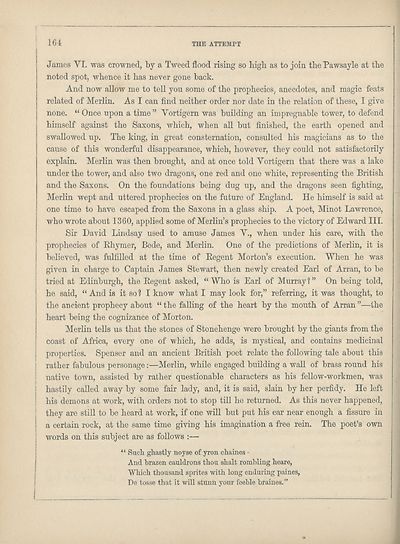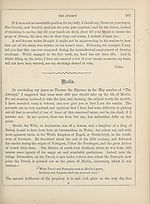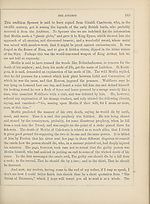Attempt > Volume 1 and Select writings
(176) Page 164
Download files
Complete book:
Individual page:
Thumbnail gallery: Grid view | List view

164
THE ATTEMPT
James YI. was crowned, by a Tweed flood rising so high as to join thePawsayle at the
noted spot, whence it has never gone hack.
And now allow me to tell you some of the prophecies, anecdotes, and magic feats
related of Merlin. As I can find neither order nor date in the relation of these, I give
none. “ Once upon a time” Yortigern was building an impregnable tower, to defend
himself against the Saxons, which, when all but finished, the earth opened and
swallowed up. The king, in great consternation, consulted his magicians as to the
cause of this wonderful disappearance, which, however, they could not satisfactorily
explain. Merlin was then brought, and at once told Vortigern that there was a lake
under the tower, and also two dragons, one red and one white, representing the British
and the Saxons. On the foundations being dug up, and the dragons seen fighting,
Merlin wept and uttered prophecies on the future of England. He himself is said at
one time to have escaped from the Saxons in a glass ship. A poet, Minot Lawrence,
who wrote about 1360, applied some of Merlin’s prophecies to the victory of Edward III.
Sir David Lindsay used to amuse James Y., when under his care, with the
prophecies of Ehymer, Bede, and Merlin. One of the predictions of Merlin, it is
believed, was fulfilled at the time of Begent Morton’s execution. When he was
given in charge to Captain James Stewart, then newly created Earl of Arran, to be
tried at Edinburgh, the Eegent asked, “ Who is Earl of Murray? ” On being told,
he said, “ And is it so ? I know what I may look for,” referring, it was thought, to
the ancient prophecy about “ the falling of the heart by the mouth of Arran ”—the
heart being the cognizance of Morton.
Merlin tells us that the stones of Stonehenge were brought by the giants from the
coast of Africa, every one of which, he adds, is mystical, and contains medicinal
properties. Spenser and an ancient British poet relate the following tale about this
rather fabulous personage:—Merlin, while engaged building a wall of brass round his
native town, assisted by rather questionable characters as his fellow-workmen, was
hastily called away by some fair lady, and, it is said, slain by her perfidy. He left
his demons at work, with orders not to stop till he returned. As this never happened,
they are still to be heard at work, if one will but put his ear near enough a fissure in
a certain rock, at the same time giving his imagination a free rein. The poet’s own
words on this subject are as follows :—
“ Such ghastly noyse of yron chaines
And brazen cauldrons thou shalt rombling heare,
Which thousand sprites with long enduring paines,
De tosse that it will stunn your feeble braines.”
THE ATTEMPT
James YI. was crowned, by a Tweed flood rising so high as to join thePawsayle at the
noted spot, whence it has never gone hack.
And now allow me to tell you some of the prophecies, anecdotes, and magic feats
related of Merlin. As I can find neither order nor date in the relation of these, I give
none. “ Once upon a time” Yortigern was building an impregnable tower, to defend
himself against the Saxons, which, when all but finished, the earth opened and
swallowed up. The king, in great consternation, consulted his magicians as to the
cause of this wonderful disappearance, which, however, they could not satisfactorily
explain. Merlin was then brought, and at once told Vortigern that there was a lake
under the tower, and also two dragons, one red and one white, representing the British
and the Saxons. On the foundations being dug up, and the dragons seen fighting,
Merlin wept and uttered prophecies on the future of England. He himself is said at
one time to have escaped from the Saxons in a glass ship. A poet, Minot Lawrence,
who wrote about 1360, applied some of Merlin’s prophecies to the victory of Edward III.
Sir David Lindsay used to amuse James Y., when under his care, with the
prophecies of Ehymer, Bede, and Merlin. One of the predictions of Merlin, it is
believed, was fulfilled at the time of Begent Morton’s execution. When he was
given in charge to Captain James Stewart, then newly created Earl of Arran, to be
tried at Edinburgh, the Eegent asked, “ Who is Earl of Murray? ” On being told,
he said, “ And is it so ? I know what I may look for,” referring, it was thought, to
the ancient prophecy about “ the falling of the heart by the mouth of Arran ”—the
heart being the cognizance of Morton.
Merlin tells us that the stones of Stonehenge were brought by the giants from the
coast of Africa, every one of which, he adds, is mystical, and contains medicinal
properties. Spenser and an ancient British poet relate the following tale about this
rather fabulous personage:—Merlin, while engaged building a wall of brass round his
native town, assisted by rather questionable characters as his fellow-workmen, was
hastily called away by some fair lady, and, it is said, slain by her perfidy. He left
his demons at work, with orders not to stop till he returned. As this never happened,
they are still to be heard at work, if one will but put his ear near enough a fissure in
a certain rock, at the same time giving his imagination a free rein. The poet’s own
words on this subject are as follows :—
“ Such ghastly noyse of yron chaines
And brazen cauldrons thou shalt rombling heare,
Which thousand sprites with long enduring paines,
De tosse that it will stunn your feeble braines.”
Set display mode to: Large image | Transcription
Images and transcriptions on this page, including medium image downloads, may be used under the Creative Commons Attribution 4.0 International Licence unless otherwise stated. ![]()
| Ladies' Edinburgh Debating Society publications > Attempt > Volume 1 and Select writings > (176) Page 164 |
|---|
| Permanent URL | https://digital.nls.uk/109867066 |
|---|
| Attribution and copyright: |
|
|---|

